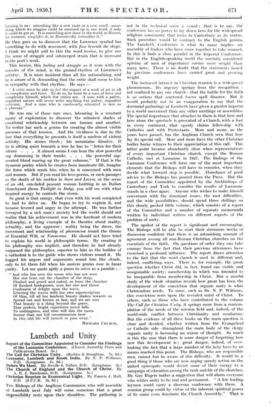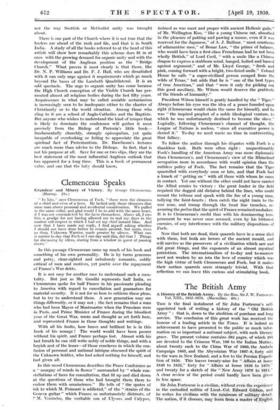Lambeth and Unity
Tan Bishops of the Anglian Communion who will assemble at Lambeth next July will come conscious that a great responsibility rests upon their shoulders. The gathering is not in the technical sense a synod ; that is to say, the conference has no power to lay down laws for the widespread religious community that looks to Canterbury as its centre. Such procedure would be contrary to the English genius., The Lambeth Conference is what its name implies—an assembly of leaders who have come together to take counsel. In this it finds a close parallel in the Imperial Conference. But in -the English-speaking world the carefully considered opinion of men of importance carries more weight than many laws. There is no doubt that the statements issued by previous conferences have carried great and growing weight.
The increased interest in Christian reunion is a widespread phenomenon. Its urgency springs from the recognition— not confined to any one church—that the battle for the faith is so serious that scattered forces spell disaster. But it would probably not be an exaggeration to say that the decennial gatherings at Lambeth have given a greater impetus to a world movement than any other meetings or assemblies. The special importance that attaches to them is that here and here alone the spectacle is presented of a Church, with a foot in every continent, that openly claims fellowship wall Catholics and with Protestants. More and more, as the years have passed, has the Anglican Church seen that here lay its special call. More and more have the other Christian bodies borne witness to their appreciation of this call. This latter point became abundantly clear when representatives of every important Christian church, except the Roman Catholic, met at Lausanne in 1927. The findings of the Lausanne Conference will form one of the most important elements that the Bishops will have to consider, when they decide what forward step is possible. Abundance of good advice to the Bishops has poured from the Press. But the report of the Committee appointed by the Archbishops of Canterbury and York to consider the results of Lausanne stands in a class apart. Anyone who wishes to make himself conversant with the dominant issues, the root difficulties, and the wide possibilities, should spend three shillings on this closely packed little volume, which consists of a report of the Committee and a number of separate memoranda written by individual writers on different aspects of the problem of unity.
The upshot of the report is significant and encouraging. The Bishops will be able to start their strenuous weeks of discussion confident that there is an astonishing amount of agreement among all non-Roman Christian churches on the essentials of the faith. On questions of order they can take courage from the fact that their previous utterances have exercised a profound influence. The report draws attention to the fact that the word church is used in different and, indeed,- conflicting, ways. There is, for example, the great question whether Christ did, in fact, found one visible and recognizable society, membership in which was intended to be inseparable from membership in Christ. But a careful study of the whole situation reveals how great has been the development of the eonviction that organic unity is what Christendom needs. To sonic, such as Dr. N. P. Williams, this convietion rests upon the revealed mind of Christ.* To others, such as those who have contributed to the volume The Call for Christian Unity, it springs more from a contem- plation of the needs of the mission field and, indeed, of the world-wide conflict between Christianity and secularism. But the evidence of all these books on the main question is clear and decided, whether written from the Evangelical or Catholic side—throughout the -main body of the clergy organic unity is becoming an axiom of thought. So much is this the case that there is some danger of forgetting how new this development is ; great danger, indeed, of over- looking the fact that a large number of the laity have by no means reached this point. The Bishops, who are responsible men, cannot but be aware of this difficulty. It would be a good thing if those who are now urging speedy action on the united episcopate would divert some of their energy to a campaign of education among the rank and file of the churches. Mr. Guy Rogers makes a suggestion that will alarm everyone who wishes unity to be real and permanent. "A few leading laymen could carry a diocesan conference with them. A reunion group could by virtue Of the inherent spiritua. l power of its cause even doininate the Church Assembly." That is
not the way Scottish or Methodist unity was brought about.
There is one part of the Church where it is not true that the leaders are ahead of the rank and file, and that is in South India. A study of all the books referred to at the head of this article will show how remarkably this scheme does fit in at once with the growing demand for organic unity and with the development of the Anglican position as the "Bridge Church." What proves it most clearly is that those, like Dr. N. P. Williams and Dr. F. J. Hall, who are dissatisfied with it can only urge against it requirements which go much beyond the bases of the Lambeth Quadrilateral. It is an odd spectacle. The urge to organic unity has come because the High Church conception of the Visible Church has per- meated almost all religious bodies during the last fifty years. Acquiescence in what may be called amiable sectarianism is increasingly seen to be inadequate either to the charter of Christianity or to the world situation. Among those who cling to it are a school of Anglo-Catholics and the Baptists. But anyone who wishes to understand the kind of temper that is likely to dominate the conference will gather it most precisely from the Bishop of Pretoria's little book— fundamentally churchly, strongly episcopalian, yet quite incapable of overlooking or failing to appreciate the great • spiritual fact of Protestantism. Dr. Rawlinson's lectures are much more than advice to the Bishops. In fact, that is not his purpose at all. Save for one or two slips, they are the best statement of the most influential Anglican outlook that has appeared for a long time. This is a book of permanent value, and one that the laity should know.











































 Previous page
Previous page